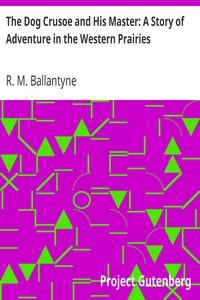|
|
Read this ebook for free! No credit card needed, absolutely nothing to pay.Words: 87547 in 35 pages
This is an ebook sharing website. You can read the uploaded ebooks for free here. No credit cards needed, nothing to pay. If you want to own a digital copy of the ebook, or want to read offline with your favorite ebook-reader, then you can choose to buy and download the ebook.

: The Dog Crusoe and His Master: A Story of Adventure in the Western Prairies by Ballantyne R M Robert Michael - Dogs Fiction; Adventure stories Children's Fiction@FreeBooksTue 06 Jun, 2023 THE DOG CRUSOE. But we draw particular attention to the fact of Crusoe's having once been a pup, because in connection with the days of his puppyhood there hangs a tale. This peculiar dog may thus be said to have had two tails--one in connection with his body, the other with his career. This tale, though short, is very harrowing, and as it is intimately connected with Crusoe's subsequent history we will relate it here. But before doing so we must beg our reader to accompany us beyond the civilized portions of the United States of America--beyond the frontier settlements of the "far west," into those wild prairies which are watered by the great Missouri River--the Father of Waters--and his numerous tributaries. Here dwell the Pawnees, the Sioux, the Delawarers, the Crows, the Blackfeet, and many other tribes of Red Indians, who are gradually retreating step by step towards the Rocky Mountains as the advancing white man cuts down their trees and ploughs up their prairies. Here, too, dwell the wild horse and the wild ass, the deer, the buffalo, and the badger; all, men and brutes alike, wild as the power of untamed and ungovernable passion can make them, and free as the wind that sweeps over their mighty plains. The squatters were well armed with axes, rifles, and ammunition. Most of the women were used to dangers and alarms, and placed implicit reliance in the power of their fathers, husbands, and brothers to protect them; and well they might, for a bolder set of stalwart men than these backwoodsmen never trod the wilderness. Each had been trained to the use of the rifle and the axe from infancy, and many of them had spent so much of their lives in the woods that they were more than a match for the Indian in his own peculiar pursuits of hunting and war. When the squatters first issued from the woods bordering the valley, an immense herd of wild horses or mustangs were browsing on the plain. These no sooner beheld the cavalcade of white men than, uttering a wild neigh, they tossed their flowing manes in the breeze and dashed away like a whirlwind. This incident procured the valley its name. The new-comers gave one satisfied glance at their future home, and then set to work to erect log huts forthwith. Soon the axe was heard ringing through the forests, and tree after tree fell to the ground, while the occasional sharp ring of a rifle told that the hunters were catering successfully for the camp. In course of time the Mustang Valley began to assume the aspect of a thriving settlement, with cottages and waving fields clustered together in the midst of it. Of course the savages soon found it out and paid it occasional visits. These dark-skinned tenants of the woods brought furs of wild animals with them, which they exchanged with the white men for knives, and beads, and baubles and trinkets of brass and tin. But they hated the "Pale-faces" with bitter hatred, because their encroachments had at this time materially curtailed the extent of their hunting-grounds, and nothing but the numbers and known courage of the squatters prevented these savages from butchering and scalping them all. The leader of this band of pioneers was a Major Hope, a gentleman whose love for nature in its wildest aspects determined him to exchange barrack life for a life in the woods. The major was a first-rate shot, a bold, fearless man, and an enthusiastic naturalist. He was past the prime of life, and being a bachelor, was unencumbered with a family. His first act on reaching the site of the new settlement was to commence the erection of a block-house, to which the people might retire in case of a general attack by the Indians. In this block-house Major Hope took up his abode as the guardian of the settlement. And here the dog Crusoe was born; here he sprawled in the early morn of life; here he leaped, and yelped, and wagged his shaggy tail in the excessive glee of puppyhood; and from the wooden portals of this block-house he bounded forth to the chase in all the fire, and strength, and majesty of full-grown doghood. When Crusoe, junior, was born, he was born, of course, without a name. That was given to him afterwards in honour of his father. He was also born in company with a brother and two sisters, all of whom drowned themselves accidentally, in the first month of their existence, by falling into the river which flowed past the block-house--a calamity which occurred, doubtless, in consequence of their having gone out without their mother's leave. Little Crusoe was with his brother and sisters at the time, and fell in along with them, but was saved from sharing their fate by his mother, who, seeing what had happened, dashed with an agonized howl into the water, and, seizing him in her mouth, brought him ashore in a half-drowned condition. She afterwards brought the others ashore one by one, but the poor little things were dead. And now we come to the harrowing part of our tale, for the proper understanding of which the foregoing dissertation was needful. One beautiful afternoon, in that charming season of the American year called the Indian summer, there came a family of Sioux Indians to the Mustang Valley, and pitched their tent close to the block-house. A young hunter stood leaning against the gate-post of the palisades, watching the movements of the Indians, who, having just finished a long "palaver" or talk with Major Hope, were now in the act of preparing supper. A fire had been kindled on the greensward in front of the tent, and above it stood a tripod, from which depended a large tin camp-kettle. Over this hung an ill-favoured Indian woman, or squaw, who, besides attending to the contents of the pot, bestowed sundry cuffs and kicks upon her little child, which sat near to her playing with several Indian curs that gambolled round the fire. The master of the family and his two sons reclined on buffalo robes, smoking their stone pipes or calumets in silence. There was nothing peculiar in their appearance. Their faces were neither dignified nor coarse in expression, but wore an aspect of stupid apathy, which formed a striking contrast to the countenance of the young hunter, who seemed an amused spectator of their proceedings. Free books android app tbrJar TBR JAR Read Free books online gutenberg More posts by @FreeBooks
: Die Brüder Wright Eine Studie ueber die Entwicklung der Flugmaschine von Lilienthal bis Wright by Hildebrandt A Alfred - Aeronautics History German Language Books; DE Sachbuch@FreeBooksTue 06 Jun, 2023
|
Terms of Use Stock Market News! © gutenberg.org.in2025 All Rights reserved.






